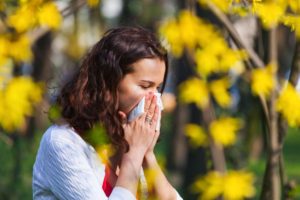What Can I Do About Allergy Season Itchy Eyes?

Spring usually means allergy season is here. Seasonal allergic rhinitis or hayfever affect about 20 per cent of the population during spring and early summer. Common symptoms include itchy, red, dry, or watery eyes.
Seasonal allergies are caused by the high pollen released by trees, grass, outdoor moulds and weeds.
Have you ever wondered what’s actually causing our eyes to react?
We have receptor cells called mast cells on the surface of our conjunctiva, the mucous membrane covering the white surface of our eye and the inner lining of the eyelids.
When the allergen comes in contact with our body, they bind to the mast cells. This causes the mast cells to release a chemical called histamine which stimulates the nerves in the eye to make it itchy and watery. This is our body’s way of trying to remove the allergen. Histamine also causes dilation of the blood vessels on the eye and make your eyes red.
Many patients usually visit the local pharmacy to pick up an oral antihistamine for relief. These medications can clear up systemic symptoms like runny noses and sneezing, but can make the eye condition worse. A side effect of antihistamines is that they have a drying effect on the eyes. Reduced tears make it more difficult to flush out allergens on the eyes and they remain on the eye longer, making things worse. Dry eyes can also cause burning and stinging.
Some of the Best and Safest Ways to Manage Your Allergy Season Itchy Eyes
- Stay indoors especially on windy days, close the windows at home and drive with the windows up in the car.
- Flush your eye with artificial tears lubricating eye drops after being outside to remove allergens.
- See your optometrist for a personalised treatment. An antihistamine-mast cell stabiliser eye drop like Patanol can be prescribed to help relieve symptoms if discomfort persists.
- Place cold compresses on your eyes, for example with a cold wet towel, this can help relieve the itching sensation.
- Avoid rubbing your eyes, as this will only make your eyes worse and can potentially cause long-term damage. People with keratoconus have a higher incidence of eye allergies. Eye rubbing causes more histamine to be released and increase itching and the urge to rub. This can cause keratoconus to get worse.
If your eyes are uncomfortable as a result of seasonal allergies, be sure to book an appointment with your John O’Connor optometrist to check your eyes. Email our Auckland Optometrists or phone Newmarket Optometrist 09 522 1283 and Henderson Optometrist 09 836 1731.

